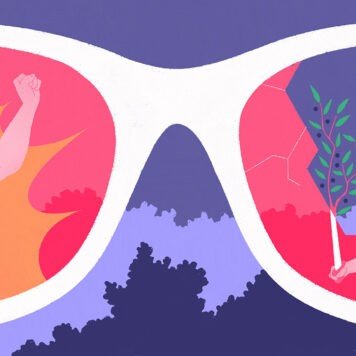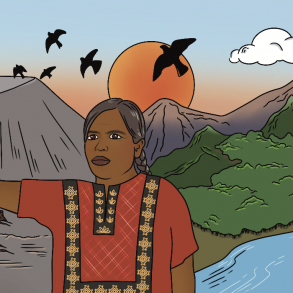“They all want a sugar daddy and think they can sell pictures of their feet to cover the rent. Maybe for the one or two lucky ones, sure that might work. But for the rest of us, it takes a lot of hard work and commitment. You have to really develop a strong persona and put the hours in. Sex work is as real a labour as any other job.”
Speaking to me via Zoom is Ellie, a Canadian online sex worker who goes by the pseudonym Ellie Next Door. Ellie’s lively, chatty and currently quite riled up. She’s talking to me about how the pandemic led to the online sex-service market being flooded by what she calls “sex tourists”. As she explained, “There’s just a lot of people who are coming in and putting their nudes online because they’re bored, and not really seeing themselves as sex workers. In fact, for many of these people, it’s just a very superficial and short-term act. On one level, it can be good to destigmatise our work. Yet on another level, it can be frustrating to see a skinny blonde girl selling their bikini pics, but in the same breath imply that other women who do sex work for a living are whores with unworthy jobs.”
In fact, according to Ellie, creating these superficial distinctions between different forms of sex work does more harm than good. “Of course online sex work is very different to in-person sex work,” she says. “But for me, sex work is sex work. I think when we start to differentiate between forms, we step into the ‘whore-archy’ where the idea that someone who does full-service sex work is ‘below’ someone who is doing OnlyFans. Separations can be unnecessary and damaging.”
For Ellie, this same logic applies when it comes to her sexuality. After being exposed to queer spaces and the ace community on Tumblr during her early teenage years, Ellie realised she was asexual. Some might find the idea of being an asexual sex worker difficult to conceptualise, but for Ellie and countless others in the industry there’s little to explain. “There’s a lot of queer sex workers and a whole spectrum of people who do this beyond straight people. So for us sex work is work, it’s a job. I’m doing it because I’m being paid. You don’t expect your barista to be obsessed with coffee! So why do people expect it from sex workers? The full service sex worker is charging you to have sex with them because they don’t want to do it for free.” However, Ellie does believe that her sexuality can aid her work. “It helps me disconnect and establish clear boundaries with my work. But that’s not to say that straight or gay sex workers are pining for their clients. Gender and sexuality can play a relatively small role for anyone in our industry.”

Ellie has been camming since May 2019, and the impact of the pandemic was complicated. On the one hand, there were the obvious frustrations at the market saturation. However, she still considers herself as one of the lucky ones for by and large surviving the pandemic. For those who worked in-person at places such as strip clubs, brothels or for escort services, the impact of COVID-19 was brutal. Many lost their main source of income, and due to the underground nature of the industry, there was a real lack of financial support from individual businesses and governments available. Workers and their families were left struggling, looking to charities and organised funds for support.
Many in-person sex workers also made the transition to working online, and felt the full force of controversial legislation such as FOSTA and SESTA, otherwise known as the Fight Online Sex Trafficking Act and the Stop Enabling Sex Traffickers Act, both of which were introduced in the USA in 2018. The bills were introduced to tackle sex trafficking and illegal activity online, but their impact has been detrimental to many of those consensually working in the sex industry. Ellie explains that “sex workers are like the canaries in the coal mine for online censorship. I don’t want to make it seem like we’re victims, but it can be frustrating to see it shrink down our work like that, and it can demonise our industry. Whilst the legislation exists with good intentions, trying to make sure that everyone who does adult work is there because they want to be, it can really limit the places that people can work. I think it risks curbing our ability to create material safely”.
Both bills prevent the advertisment of sex work on various sites, but according to research done on the topic, giving sex workers opportunities to advertise increases their safety and allows them more choice. As Ellie elaborates, a by-product of legislation is further criminalisation of the industry. “It’s like any other so-called ‘immoral’ or ‘elicit’ industry,” she says. “You can criminalise drugs, but you can’t stop people taking them. You can criminalise abortion but you can’t stop people getting abortions, they simply will find a way to do so. All criminalisation does is make it more dangerous and dehumanising for everyone involved.” Plus, in order to be on certain sites, sex workers are expected to provide various documents which can risk exposing their identity. Whilst Ellie hasn’t had any bad experiences so far, she emphasises how important her anonymity is for her and many of her colleagues. “It’s essential for me to do what I do. Putting yourself anywhere online can put you at risk, and you can never predict what will randomly blow up. Take people who go viral on TikTok out of the blue! I’m not planning for everyone I know to see my work, but at the same time I accept that I can’t completely control that. Giving me that anonymity protects me from having to get into uncomfortable conversations, and more importantly it keeps me safe and more in control online.”
The call for legislation that protects sex workers rather than criminalises them is not new. However, after talking to Ellie it’s clear that with increasing pressures and market saturation due to the pandemic, it has never been more necessary. If this multi-billion pound industry is to survive, we must accept, respect and support those working within it, sooner rather than later. It’s time for legislation that builds, rather than breaks sex work.














